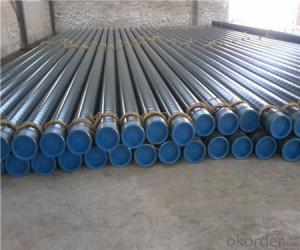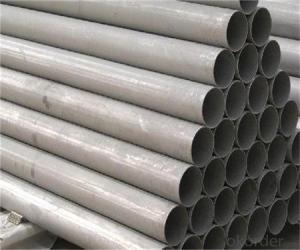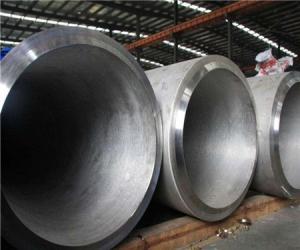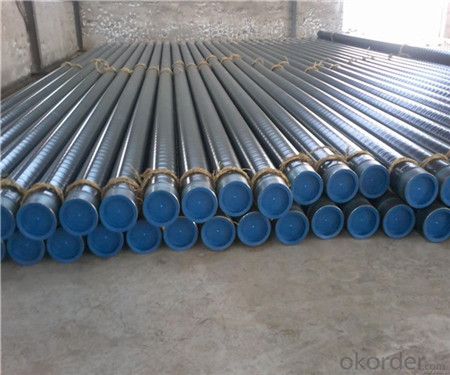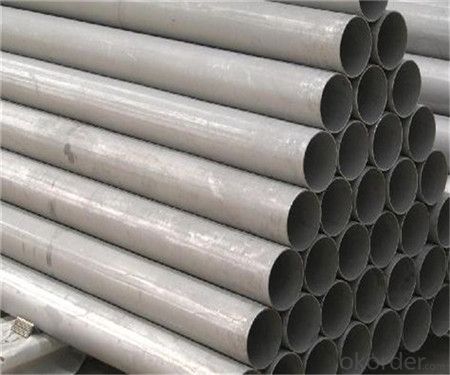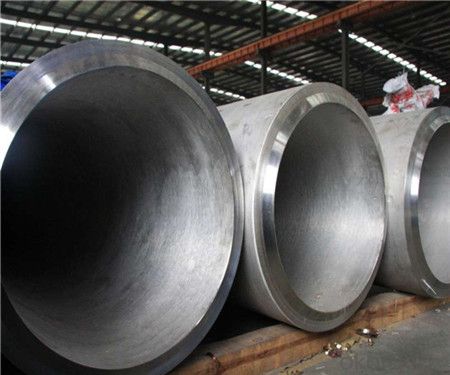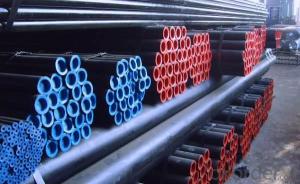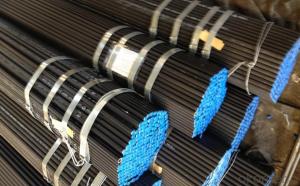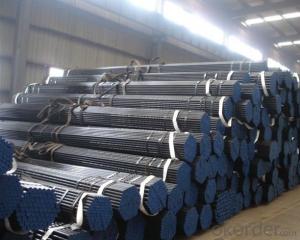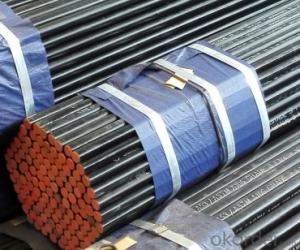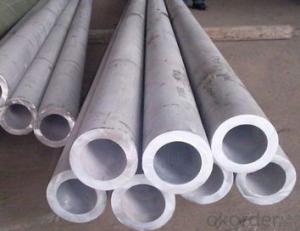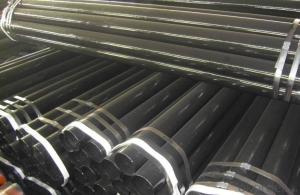Seamless Carbon Steel Pipe with API-05377/A53/A106
- Loading Port:
- Tianjin
- Payment Terms:
- TT OR LC
- Min Order Qty:
- 25 m.t.
- Supply Capability:
- 20000 m.t./month
OKorder Service Pledge
OKorder Financial Service
You Might Also Like
Seamless steel pipe
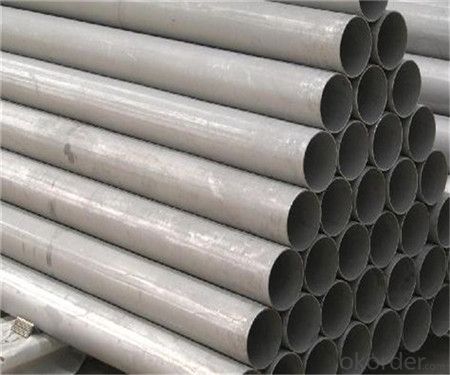
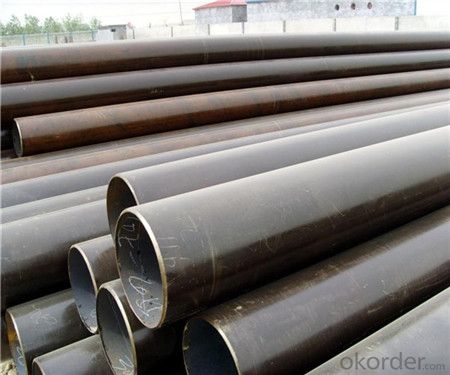
1、Structure :
Seamless pipe is formed by drawing a solid billet over a piercing rod to create the hollow shell. As the manufacturing process does not include any welding, seamless pipes are perceived to be stronger and more reliable. Historically seamless pipe was regarded as withstanding pressure better than other types, and was often more easily available than welded pipe.
2、Features :
• High manufacturing accuracy
• High strength
• Small inertia resistance
• Strong heat dissipation ability
• Good visual effect
• Reasonable price
3、Specification:
Standard | GB, DIN, ASTM ASTM A106-2006, ASTM A53-2007 |
Grade | 10#-45#, 16Mn 10#, 20#, 45#, 16Mn |
Thickness | 8 - 33 mm |
Section Shape | Round |
Outer Diameter | 133 - 219 mm |
Place of Origin | Shandong, China (Mainland) |
Secondary Or Not | Non-secondary |
Application | Hydraulic Pipe |
Technique | Cold Drawn |
Certification | API |
Surface Treatment | factory state or painted black |
Special Pipe | API Pipe |
Alloy Or Not | Non-alloy |
Length | 5-12M |
Outer Diameter | 21.3-610mm |
Grade | 20#, 45#, Q345, API J55, API K55, API L80, API N80, API P110, A53B |
Standard | ASME, ASTM |
1) Material:20#(ASTM A 106/A53 GRB.API5LGRB,GB),45#,16Mn,10#.
2) Specification range:OD:21.3-610mm,WT:6-70mm,length:6-12m or according to the requirement of clients.
3) Excutive standards:GB,ASME API5L.ASTM A 106/A53,Despite of the above standards,we can also supply seamless steel pipe with standard of DIN,JIS,and so on,and also develop new products according to the requirements of our clients!
4) Surface:black lacquered,varnish coating or galvanized.
5) Ends:Beveled or square cut,plastic capped,painted.
6) Packing:bundles wrapped with strong steel strip,seaworthy packing.
4、Packaging & Delivery
Packaging Details: | seaworthy package,bundles wrapped with strong steel strip |
Delivery Detail: | 15-30days after received 30%TT |
5、FAQ :
①How is the quality of your products?
Our products are manufactured strictly according to national and internaional standard, and we take a test
on every pipe before delivered out. If you want see our quality certifications and all kinds of testing report, please just ask us for it.
Guaranteed: If products’ quality don’t accord to discription as we give or the promise before you place order, we promise 100% refund.
②How about price?
Yes, we are factory and be able to give you lowest price below market one, and we have a policy that “ for saving time and absolutely honest business attitude, we quote as lowest as possible for any customer, and discount can be given according to quantity”,if you like bargain and factory price is not low enough as you think, just don’t waste your time.Please trust the quotation we would give you, it is professional one.
③Why should you chose us?
Chose happens because of quality, then price, We can give you both.Additionally, we can also offer professional products inquiry, products knowledge train(for agents), smooth goods delivery, exellent customer solution proposals.Our service formula: good quality+good price+good service=customer’s trust
SGS test is available, customer inspection before shipping is welcome, third party inspection is no problem.
- Q: How do you solder purple copper plate and steel tube?
- When the copper pipe and the size is not too large, such as 10 mm below the pipe welding, brazing is suggested, with brass solder, such as Wei Odin 201 solder, with supporting solder paste, with a neutral flame welding, the copper plate is heated to about 800 degrees, and then use the solder with 201 Wei Odin 201-F in solder welding, welding wire with melt molding.
- Q: What are the factors to consider when selecting pipe materials for high-temperature applications?
- When choosing pipe materials for high-temperature applications, several factors must be taken into account. First and foremost, the thermal conductivity of the material is crucial. Efficient heat transfer and prevention of heat buildup are necessary in high-temperature applications, therefore materials with high thermal conductivity, like copper and stainless steel, are commonly used in these installations. Secondly, it is important to consider the material's resistance to thermal expansion. Pipes tend to expand when exposed to high temperatures, so selecting materials with low thermal expansion coefficients is vital to avoid deformation and potential pipe failure. Carbon steel and stainless steel are suitable options as they exhibit relatively low thermal expansion. The material's mechanical strength and resistance to corrosion should also be considered. High temperatures can weaken or corrode certain materials, leading to structural failures. Therefore, it is essential to choose materials, such as alloy steel and nickel-based alloys, that can withstand high temperatures without compromising their mechanical strength or corroding easily. Additionally, the cost and availability of the materials should be taken into account. Some high-temperature pipe materials may be expensive or hard to obtain, which can impact the project's budget and timeline. It is important to find a balance between the desired material properties and the project's financial and logistical constraints. Lastly, it is crucial to consider the specific application requirements and industry standards. Different industries may have guidelines or regulations regarding pipe materials for high-temperature applications. Ensuring that the selected materials comply with these standards is essential for safety, reliability, and adherence to industry regulations. To conclude, the factors to consider when choosing pipe materials for high-temperature applications include thermal conductivity, resistance to thermal expansion, mechanical strength, resistance to corrosion, cost and availability, and compliance with industry standards. By carefully evaluating these factors, one can select the most suitable pipe material to ensure efficient and reliable operation in high-temperature environments.
- Q: What is the meaning of "DN" and "Phi" in the dimensioning of steel pipe diameter and how to apply the mark?
- DN represents the path of the tube". Fair represents diameter. Path is the diameter of the fluid through which it should be inside. The diameter may be the outer diameter or the inner diameter. The diameter is only used when the pipe is used for flow through. Fair as long as the garden can be used. According to the requirements of mechanical drawing fair, DN text notes.
- Q: What are the common standards for coating and lining of steel pipes?
- Various organizations and regulatory bodies have outlined the common standards for coating and lining steel pipes to ensure their durability, corrosion resistance, and overall quality. These standards are widely recognized and utilized in different industries. Here are some examples: 1. The American Society for Testing and Materials (ASTM) has developed numerous standards for coating and lining steel pipes. For instance, ASTM A775/A775M addresses epoxy-coated reinforcing steel, ASTM A1064/A1064M focuses on metallic-coated steel wire, and ASTM A1057/A1057M covers fusion-bonded epoxy-coated steel reinforcement. 2. The American Water Works Association (AWWA) has established standards specifically for coating and lining steel pipes used in the water industry. AWWA C210 deals with liquid epoxy coating systems for both the interior and exterior of steel water pipelines, while AWWA C213 focuses on fusion-bonded epoxy coating for these pipelines. 3. The National Association of Corrosion Engineers (NACE) develops standards and recommended practices for corrosion control in steel pipes. NACE SP0169 provides guidelines for selecting and applying coatings for underground or submerged steel pipelines, and NACE SP0198 offers recommendations for external coatings of steel pipelines. 4. The International Organization for Standardization (ISO) has also developed various standards pertaining to coating and lining steel pipes. ISO 21809-1 specifies the requirements for external coatings applied to buried or submerged pipelines, while ISO 21809-2 concentrates on the internal coating and lining of such pipelines. These standards encompass multiple aspects of the coating and lining process, including surface preparation, application methods, minimum coating thickness, adhesion, and quality control. Adhering to these standards ensures that steel pipes receive proper protection against corrosion, abrasion, and other forms of deterioration. Consequently, they enjoy a longer service life and enhanced performance in industries such as oil and gas, water supply, and infrastructure.
- Q: Are steel pipes suitable for solar power plants?
- Yes, steel pipes are suitable for solar power plants. Steel pipes are often used in the construction of solar power plants due to their durability, strength, and resistance to corrosion. They can be used for various purposes in a solar power plant, including the transportation of fluids such as water or heat transfer fluids, as well as providing structural support for solar panels and other equipment. Steel pipes are capable of withstanding high temperatures and pressure, making them ideal for the efficient operation of solar power plants. Additionally, steel pipes are readily available and cost-effective, making them a popular choice in the construction of solar power plants.
- Q: How do you protect steel pipes from fire?
- There are several measures available to protect steel pipes from fire. One commonly used approach involves applying fire-resistant coatings or paints to the surface of the pipes. These coatings or paints are specifically designed to endure high temperatures and create a barrier that prevents heat from reaching the steel. Another effective method is to wrap the steel pipes with fire-resistant insulation materials. These materials serve as a buffer, reducing heat transfer and slowing down the spread of fire. Mineral wool or ceramic fiber blankets are commonly utilized for this purpose. It is also crucial to ensure proper installation and support for the steel pipes. This includes maintaining adequate clearance from other flammable substances and avoiding overcrowding or obstructions that could hinder the flow of air around the pipes. Sufficient spacing between pipes is also essential to prevent heat transfer between them. Moreover, incorporating firestop systems is recommended when steel pipes pass through fire-rated walls or floors. These systems consist of fire-resistant materials and seals that prevent the spread of fire and smoke through openings or penetrations in fire-rated barriers. Regular maintenance and inspections are essential to uphold the ongoing effectiveness of the fire protection measures. Any damage or deterioration of the coatings, insulation, or firestop systems should be promptly addressed to maintain the fire resistance of the steel pipes. In conclusion, a combination of fire-resistant coatings, insulation, proper installation, and maintenance practices is imperative for safeguarding steel pipes against fire hazards. These measures play a crucial role in minimizing the risk of fire-related damage and ensuring the safety of both the pipes and the surrounding environment.
- Q: How are steel pipes used in the manufacturing of hydraulic systems?
- Steel pipes are commonly used in the manufacturing of hydraulic systems due to their strength, durability, and resistance to high pressure. These pipes act as conduits to transport hydraulic fluid, allowing the system to transfer power and control the movement of machinery. The steel pipes provide a reliable and leak-free connection, ensuring efficient and safe operation of the hydraulic system.
- Q: What are the different types of steel pipe coatings for offshore applications?
- There are several types of steel pipe coatings commonly used for offshore applications. These include fusion-bonded epoxy (FBE) coatings, three-layer polyethylene (3LPE) coatings, three-layer polypropylene (3LPP) coatings, and concrete weight coatings. Each of these coatings offer different levels of protection against corrosion and abrasion in offshore environments, and the choice of coating depends on factors such as the specific offshore application, the surrounding environment, and the durability requirements.
- Q: How are steel pipes used in the construction of biomass power plants?
- Steel pipes are commonly used in the construction of biomass power plants for various purposes. They are used to transport and distribute water, steam, and other fluids within the plant, as well as to carry and contain biomass fuel, such as wood chips or agricultural waste. Steel pipes are also used for structural purposes, providing support for equipment and structures within the plant. Additionally, they are used for exhaust systems and ventilation, ensuring the safe release of gases and managing air circulation. Overall, steel pipes play a crucial role in the efficient and reliable operation of biomass power plants.
- Q: How are steel pipes used in automotive manufacturing?
- Steel pipes are widely used in automotive manufacturing for various purposes. One of the primary applications of steel pipes in this industry is for the exhaust system. The exhaust system in vehicles is responsible for the safe removal of harmful gases produced during the combustion process. Steel pipes are used to create the exhaust manifold, which collects the exhaust gases from the engine cylinders and directs them towards the exhaust pipe. Furthermore, steel pipes are also used in the manufacturing of the chassis and frame of vehicles. The chassis provides structural support and helps maintain the overall strength and stability of the vehicle. Steel pipes, due to their high strength and durability, are ideal for creating the chassis and frame. These pipes are often welded together to form a rigid and robust structure that can withstand various forces and impacts. Additionally, steel pipes find applications in the suspension system of automobiles. The suspension system is responsible for providing a comfortable and smooth ride by absorbing shocks and vibrations. Steel pipes are used in the manufacturing of suspension components such as control arms, tie rods, and sway bars. These components help maintain the stability, handling, and overall performance of the vehicle. Moreover, steel pipes are utilized in the fuel system of automobiles. They are used to transport fuel from the fuel tank to the engine. These pipes need to be resistant to corrosion and have high tensile strength to ensure the safe and efficient delivery of fuel. In conclusion, steel pipes play a crucial role in automotive manufacturing. They are used in various applications such as the exhaust system, chassis and frame construction, suspension system, and fuel system. The use of steel pipes in these areas ensures the durability, strength, and performance of vehicles while maintaining safety and efficiency.
Send your message to us
Seamless Carbon Steel Pipe with API-05377/A53/A106
- Loading Port:
- Tianjin
- Payment Terms:
- TT OR LC
- Min Order Qty:
- 25 m.t.
- Supply Capability:
- 20000 m.t./month
OKorder Service Pledge
OKorder Financial Service
Similar products
Hot products
Hot Searches
Related keywords
